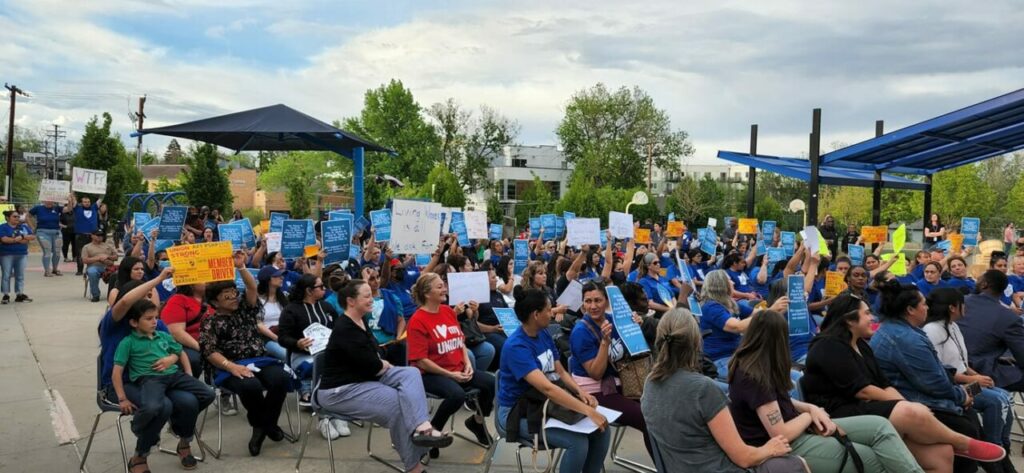By Nora Ridgeway
Bilingual paraprofessional Carolina Galvan-Palomares works 40 hours a week in an early childhood education classroom at Escuela Valdez in Denver Public Schools.
Though she has worked in the district for three years as a paraprofessional, an essential classroom employee, she is paid Denver’s minimum wage: $15.87 an hour. Her annual salary of roughly $23,000 makes it impossible for her to qualify for a loan to purchase a home for her and her family, a goal she said she has had for many years. Even though Galvan-Palomares is a full-time employee, she cannot afford the cost of the district’s health insurance plan.
Galvan-Palomares’ story is not unique. She is one of the thousands of education service providers in DPS fighting for a living wage. This list includes custodians, bus drivers, paraprofessionals, food service workers, groundskeepers, and others.

School in support of the school district providing them with higher wages. Photo: Facebook/Brandy Beck
Maria Cardenas, a paraprofessional who has worked for DPS for over 20 years, has not yet hit the $20 an hour mark. “It’s hard now … everything is getting more expensive,” Cardenas lamented.
In order to make ends meet, two of her adult daughters live with her and share in household expenses, including assisting with the mortgage payment and water bill. “If I didn’t have them, I wouldn’t think I’d be able to make it,” she said.
Between her and her daughters, it is a constant juggling act to arrange childcare for her young grandchildren, as daycare is unaffordable. Evon Torres, a food service employee in DPS, is about to celebrate a milestone: 10 years working in the district.
Torres stated that her low pay does not make her feel valued as an employee and that conversations about fair pay for district employees often leave food service workers out entirely.
“As we’ve all learned growing up, it takes a village,” Torres said. “And we in food service are part of that village.”
In her managerial role, Torres asserts the low pay rates also pose a challenge to recruiting and hiring qualified professionals, as DPS is unable to remain competitive with places offering $18 an hour to walk in the door, no experience necessary.
Knowing her circumstances were similar to many workers across the district, Galvan-Palomares set out to raise awareness about the challenges she is facing while trying to afford to live while making minimum wage.
On May 16 she and other education service providers held a public action in conjunction with Coloradans for the Common Good, an organization made up of faith, labor and other community institutions. Nearly 300 paraprofessionals, food service workers, bus drivers, custodians, and community members all gathered at Escuela Valdez to demand living wages.
One goal for the rally was to inform district parents of the situation. One parent of a student at Valdez spoke about how shocked he was to learn that the paraprofessionals in the school were making such low wages. Galvan-Palomares is telling parents to write to the DPS Board of Education in support of the efforts.
“They will listen to the community,” she said.
Torres said she feels fortunate to have support from the parents in her building, and she’s hopeful the parents at other schools follow suit.
“Parents are just like us, working to pay their bills and take care of their kids.”
Cardenas had a three-word message for parents: “Help us fight.” Superintendent Alex Marrero was not able to attend the rally due to COVID protocols.
When asked if she has a message for Marrero, Cardenas replied, “You have the money. We know you have the money. Give it out. For once, let people live.”
The workers fighting for living wages have the support of the Denver Federation for Paraprofessionals and Nutrition Service Employees union which consists of over 1,200 members. Union president Bernadette Jiron started as a paraprofessional working for DPS in 1975, and has held her elected position for more than 20 years.
When asked if she is able to speak about the bargaining happening between the union and DPS, Jiron quipped, “what bargaining?” On April 27 the union met with district staff to present their wage proposal, but DPS did not have a proposal to present.
On May 24 the two groups met once more, but the district did not present a counterproposal.
“In my opinion, it was two hours of wasted time that they could’ve told us in an email,” Jiron said.
The union has said they will not meet with DPS again until DPS has a drafted proposal. Jiron remains hopeful that DPS will come to an agreement with the union.
“It’s power in numbers, and we’ve got the numbers, and we will succeed,” Jiron said. “We’re here for one purpose: the kids.”

Be the first to comment